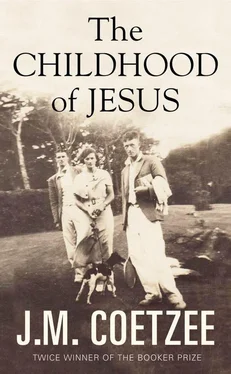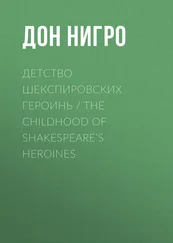The porter dials a number. This time there is a reply. ‘A gentleman at the gate to see you,’ he hears him say. ‘Yes. . yes. .’ He turns to them. ‘You did say it was a family matter, did you not, sir?’
‘Yes, a family matter.’
‘And the name?’
‘The name is of no concern.’
The porter closes the door and resumes his conversation. At last he emerges. ‘The lady will see you, sir,’ he says. ‘However, there is a slight difficulty. Children are not allowed into the Residencia. I am afraid your little boy will have to wait here.’
‘That’s strange. Why are children not allowed?’
‘No children in the Residencia, sir. That’s the rule. I don’t make the rules, I just apply them. He will have to stay behind while you pay your family visit.’
‘Will you stay with this gentleman?’ he asks the boy. ‘I’ll be back as soon as I can.’
‘I don’t want to,’ says the boy. ‘I want to come with you.’
‘I understand that. But I am sure, as soon as the lady hears you are waiting out here, she will want to come out and meet you. So will you make a big sacrifice and stay behind with this gentleman, just for a short while?’
‘Will you come back? Do you promise?’
‘Of course.’
The boy is silent, will not meet his eye.
‘Can’t you make an exception in this case?’ he asks the porter. ‘He will be very quiet, he won’t disturb anyone.’
‘Sorry, sir, no exceptions. Where would we be if we began making exceptions? Soon everyone would want to be an exception, and then there would be no rules left, would there?’
‘You can play in the garden,’ he tells the boy. To the porter: ‘He can play in the garden, can’t he?’
‘Of course.’
‘Go and climb a tree,’ he tells the boy. ‘There are lots of trees good for climbing. I’ll be back in no time.’
Following the porter’s instructions, he crosses the quadrangle, passes through a second entranceway, and knocks at a door with the word Una on it. There is no reply. He enters.
He is in a waiting room. The walls are papered in white, with a motif of a lyre and lily in pale green. From hidden lamps white light is cast discreetly upward. There is a sofa in white imitation leather, and two easy chairs. On a small table by the door are half a dozen bottles, and glasses of all shapes.
He sits down, waits. The minutes pass. He rises and peers down the corridor. No sign of life. Idly he examines the bottles. Cream sherry, dry sherry. Vermouth. Alcohol content by volume 4 %. Oblivedo. Where is Oblivedo?
Then suddenly she is there, still in her tennis clothes, solider than she had seemed on the court, almost heavy-set. She bears a plate, which she places on the table. Without greeting him she seats herself on the sofa, crosses her legs under her long skirt. ‘You wanted to see me?’ she says.
‘Yes.’ His heart is beating fast. ‘Thank you for coming. My name is Simón. You don’t know me, I am of no importance. I come on behalf of someone else, bearing a proposal.’
‘Won’t you sit?’ she says. ‘Something to eat? A glass of sherry?’
With an unsteady hand he pours a glass of sherry and takes one of the flimsy little triangular sandwiches. Cucumber. He sits opposite her, downs the sweet liquor. It goes straight to his head. The tension lifts, and words come in a rush.
‘I have brought someone here. In fact the child you saw at the tennis court. He is outside, waiting. The porter would not allow him in. Because he is a child. Will you come and meet him?’
‘You have brought a child to meet me?’
‘Yes.’ He rises and pours himself another glass of the liberating sherry. ‘I am sorry — this must be confusing, strangers arriving without announcement. But I can’t tell you how important it is. We have been —’
Without warning the door swings open and the boy himself is before them, out of breath, panting.
‘Come here,’ he beckons to the boy. ‘Do you recognize the lady now?’ He turns to her. Her face is frozen in alarm. ‘May he take your hand?’ And to the boy: ‘Come, take the lady’s hand.’
The boy stands stock-still.
Now the porter himself arrives on the scene, clearly upset. ‘I’m sorry, sir,’ he says, ‘but this is against the rules, as I warned you. I must ask you to leave.’
He turns to the woman in appeal. Surely she does not have to submit to this porter and his rules. But she utters no word of protest.
‘Have a heart,’ he says to the porter. ‘We have travelled a long way. What if we all retired to the garden? Would that still be against the rules?’
‘No, sir. But note, the gates close at five o’clock sharp.’
He addresses the woman. ‘Can we go out into the garden? Please! Give me a chance to explain.’
In silence, the boy holding his hand, the three of them cross the quadrangle into the tangled garden.
‘This must once have been a magnificent establishment,’ he remarks, trying to clear the air, trying to sound like a sensible adult. ‘A pity the garden is so neglected.’
‘We have only one full-time gardener. It is too much for him.’
‘And you yourself? Have you been resident here long?’
‘For a while. If we follow that path there, we come out at a pond with goldfish. Your son may like that.’
‘In fact I am not his father. I look after him. I am a guardian of sorts. Temporarily.’
‘Where are his parents?’
‘His parents. . That is the reason why we are here today. The boy does not have parents, not in the usual way. There was a mishap on board the boat during the voyage here. A letter went missing that might have explained everything. As a result, his parents are lost, or, more accurately, he is lost. He and his mother have been separated, and we are trying to find her. His father is a different matter.’
They have reached the promised pond, in which there are indeed goldfish, both small and large. The boy kneels down at the edge, using a frond of sedge in an attempt to lure them.
‘Let me be more precise,’ he says, speaking softly and rapidly. ‘The boy has no mother. Ever since we got off the boat we have been searching for her. Will you consider taking him?’
‘Taking him?’
‘Yes, being a mother to him. Being his mother. Will you take him as your son?’
‘I don’t understand. In fact I understand nothing at all. Are you suggesting that I adopt your boy?’
‘Not adopt. Be his mother, his full mother. We have only one mother, each of us. Will you be that one and only mother to him?’
Up to this point she has been listening attentively. But now she begins to glance around a little wildly, as if hoping that someone — the porter, one of her tennis companions, anyone — will come to her rescue.
‘What of his real mother?’ she says. ‘Where is she? Is she still alive?’
He had thought the child was too absorbed in the goldfish to be listening. But now he suddenly pipes up: ‘She’s not dead!’
‘Then where is she?’
The child is silent. For a while he too is silent. Then he speaks. ‘Please believe me — please take it on faith — this is not a simple matter. The boy is without mother. What that means I cannot explain to you because I cannot explain it to myself. Yet I promise you, if you will simply say Yes, without forethought, without afterthought, all will become clear to you, as clear as day, or so I believe. Therefore: will you accept this child as yours?’
She glances at her wrist, on which there is no wristwatch. ‘It’s getting late,’ she says. ‘My brothers will be expecting me.’ She turns and strides swiftly back towards the residence, her skirt swishing through the grass.
He runs after her. ‘Please!’ he says. ‘One moment more. Here. Let me write down his name. His name is David. That is the name he goes by, the name he was given in the camp. And this is where we live, just outside the city, in the East Village. Please think about it.’ He presses the scrap of paper into her hand. Then she is gone.
Читать дальше












